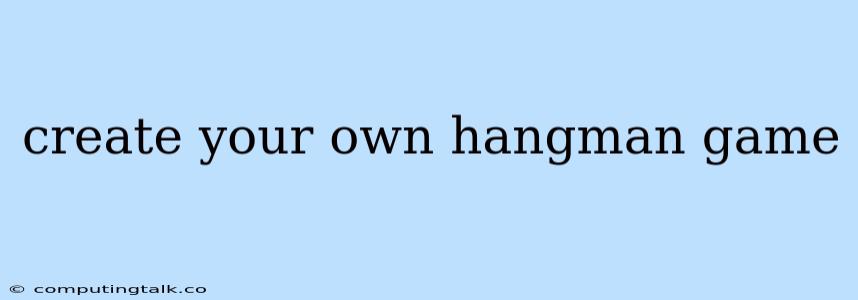Creating your own hangman game is a fun and engaging project, perfect for beginners learning to code. It's a classic game where you guess letters to try and solve a hidden word. Let's break down the steps involved in creating your own hangman game.
Understanding the Core Mechanics
At its heart, the hangman game requires a few fundamental components:
- Word Selection: The game begins with choosing a secret word. You can either have a predefined list of words or have the program randomly select a word from a dictionary.
- Display: The game needs to visually represent the word, initially showing only blanks or underscores for each letter. As the player guesses correctly, letters are revealed.
- Guesses: Players guess letters one by one.
- Hangman Image: A visual representation of the hangman gradually takes shape with each incorrect guess.
- Winning and Losing: The player wins by correctly guessing all the letters in the word. They lose if they make too many incorrect guesses.
Choosing a Programming Language
The language you choose depends on your comfort level. Here are some popular options:
- Python: Python is widely used for beginners due to its simple syntax and readability.
- JavaScript: Ideal for creating web-based versions of the game.
- C++: More powerful for complex game development, but requires a steeper learning curve.
Basic Structure of the Game
Let's outline the basic structure of the game:
-
Initialization:
- Select a random word from a list.
- Create a variable to store the number of incorrect guesses (e.g.,
incorrect_guesses = 0). - Initialize the word display (e.g.,
word_display = ["_" for _ in range(len(word))]).
-
Game Loop:
- Get the player's guess.
- Check if the guess is correct:
- If correct, reveal the letter(s) in
word_display. - If incorrect, increase
incorrect_guesses.
- If correct, reveal the letter(s) in
- Update the hangman image based on
incorrect_guesses. - Check if the player has won or lost.
-
Winning and Losing Conditions:
- Win: If all letters in the word are revealed.
- Lose: If the number of incorrect guesses reaches a predetermined limit (e.g., 6).
Coding Example (Python)
import random
def hangman():
"""Plays a simple hangman game."""
word_list = ["python", "javascript", "programming", "computer"]
word = random.choice(word_list)
word_display = ["_" for _ in range(len(word))]
incorrect_guesses = 0
max_guesses = 6
while incorrect_guesses < max_guesses:
print(" ".join(word_display))
print(f"Incorrect Guesses: {incorrect_guesses}/{max_guesses}")
guess = input("Guess a letter: ").lower()
if len(guess) != 1 or not guess.isalpha():
print("Invalid input. Please enter a single letter.")
continue
if guess in word:
for i in range(len(word)):
if word[i] == guess:
word_display[i] = guess
print("Correct!")
else:
incorrect_guesses += 1
print("Incorrect.")
if "_" not in word_display:
print("You win! The word was:", word)
break
if incorrect_guesses == max_guesses:
print("You lose! The word was:", word)
if __name__ == "__main__":
hangman()
Adding Features
Once you have a basic hangman game working, you can add more features:
- Word Categories: Allow the player to choose from different word categories (e.g., animals, fruits, countries).
- Hints: Provide hints to help players solve difficult words.
- Graphics: Use graphics libraries (like Pygame for Python) to create a more visually appealing game.
- Sound Effects: Add sound effects for correct and incorrect guesses.
- Multiplayer: Allow two players to play against each other.
Tips for Beginners
- Start Simple: Focus on getting the core game mechanics working first.
- Break Down Tasks: Divide the game into smaller, manageable tasks.
- Use Comments: Add comments to your code to explain what each section does.
- Test Thoroughly: Test your game with different words and inputs.
- Online Resources: Explore online tutorials and resources for help.
Conclusion
Creating your own hangman game is a great way to practice your coding skills and learn fundamental game development concepts. By following the steps outlined in this guide and adding your own creative features, you can build a fun and engaging game. Remember to have fun and be patient as you learn and explore the world of programming!
